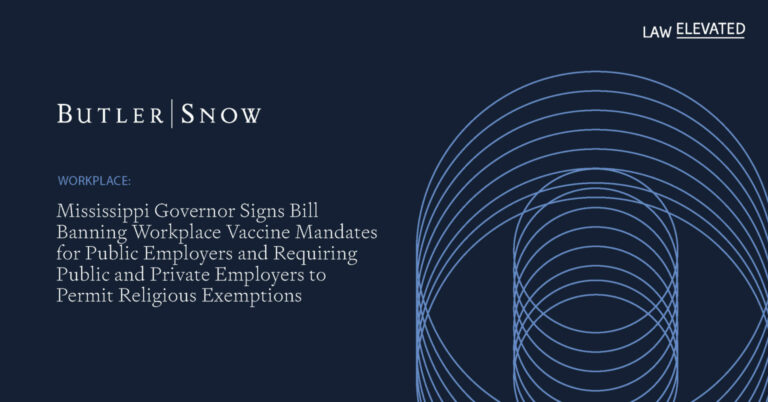Mississippi joins the list of states limiting public employer COVID-19 vaccine mandates. On April 22, 2022, Gov. Tate Reeves signed a bill banning public institutions and agencies from discriminating against people based on their COVID-19 vaccination status or whether the person has an immunity passport.[1] The new law prohibits state and local government agencies (with limited exceptions) from denying employment or otherwise discriminating against employees based on the employee’s vaccination status or whether the employee has an immunity passport. The bill also prohibits private and public employers from requiring a COVID-19 vaccine for employees who have “a sincerely held religious objection to receiving a vaccine for COVID-19.” The law is effective immediately.
No Vaccine Mandates for Public Employers
House Bill 1509 applies to any “state agency, public official, state institution of higher learning, public community or junior college, county, municipality or other political subdivision of the state.” The law defines COVID-19 vaccination status as “an indication of whether a person has received one or more doses of a vaccine for COVID-19.” HB1509, §1, ¶(1)(b). The act defines immunity passport as “a document, digital record, or software application indicating that a person has immunity to COVID-19, either through vaccination or infection and recovery.” HB1509, §1, ¶(1)(a).
The new law makes it unlawful for public employers “to refuse employment to a person, to bar a person from employment, or to discriminate against a person in compensation or in a term, condition, or privilege of employment based on the person’s COVID-19 vaccination status or whether the person has an immunity passport.” HB1509, §1, ¶2(b).
Exceptions and Exemptions
The bill does not prohibit public employers from recommending that an employee receive a COVID-19 vaccination. HB1509, §1, ¶(4)(a). The new law provides some exceptions for public healthcare facilities. Healthcare facilities are exempt from this law “during any period of time that compliance with this act would result in a violation of regulations or guidance issued by the Centers for Medicare and Medicaid Services or the Centers for Disease Control and Prevention.” HB1509, §2. As readers are likely aware, the Centers for Medicare and Medicaid Services (CMS) COVID-19 vaccine mandate (the CMS Mandate) has survived numerous legal challenges and currently requires COVID-19 vaccination of all healthcare workers at certain CMS-covered facilities, subject to religious and medical exemptions. [2] Public entities covered by the CMS Mandate are expressly exempt from the ban on COVID-19 vaccination mandates.
Mississippi’s new law also clarifies that healthcare facilities are not violating Mississippi’s new law when implementing reasonable accommodation measures for employees (and others) who are not vaccinated for COVID-19 to protect the safety and health of employees (and others) and are permitted to ask for employee vaccination status when determining whether measures need to be implemented to protect employees, patients, and others. HB1509, §1, ¶(4)(b).
Private and Public Employers Cannot Require COVID-19 Vaccination for Employees Who Have a Sincerely Held Religious Objection.
The law does not prohibit private employers from adopting COVID-19 vaccine mandates, but mandates that both private and public employers “shall not” require a COVID-19 vaccine for employees who have “a sincerely held religious objection to receiving a vaccine for COVID-19.” HB1509, §1, ¶(5). While the act’s use of the term “sincerely held religious” objection mirrors Title VII’s well-known “sincerely held religious belief” standard, the act does not reference Title VII and does not reference the ability of a private employer to deny a requested exemption due to undue hardship, as allowed under Title VII.[3] Given the mandatory language of the act and lack of guidance, Mississippi employers, both public and private, should approach COVID-19 vaccine religious exemption requests with caution.
Key Takeaways
The legal landscape surrounding vaccine mandates and exemptions at both the state and federal level is constantly evolving. While Mississippi’s law curtailing COVID-19 vaccination mandates focuses almost entirely on public employers, it creates questions for both public and private employers about the practical applications of an employee’s religious objection exemption. Private and public employers should exercise caution and seek legal counsel when analyzing an employee’s request for religious exemption to a COVID-19 vaccine mandate.
[1] The ban on vaccine mandates makes it unlawful for a public entity (1) “to exclude, limit, segregate, refuse to serve” or (2) “to refuse, withhold from, or deny to a person any local or state services, goods, facilities, advantages, privileges, licensing, educational opportunities, health care access, or employment opportunities based on the person’s COVID-19 vaccination status or whether the person has an immunity passport.” HB1509, §1, ¶2(a)&(c). The Mississippi law also specifies COVID-19 vaccinations cannot be required for children to attend public or private school or daycare. HB1509, §1, ¶3.
[2] You can find our articles on legal challenges to the CMS Vaccine Mandate here and here.
[3] Under Title VII, the undue hardship defense to providing religious accommodation requires a showing that the proposed accommodation in a particular case poses a “more than de minimis” cost or burden.
